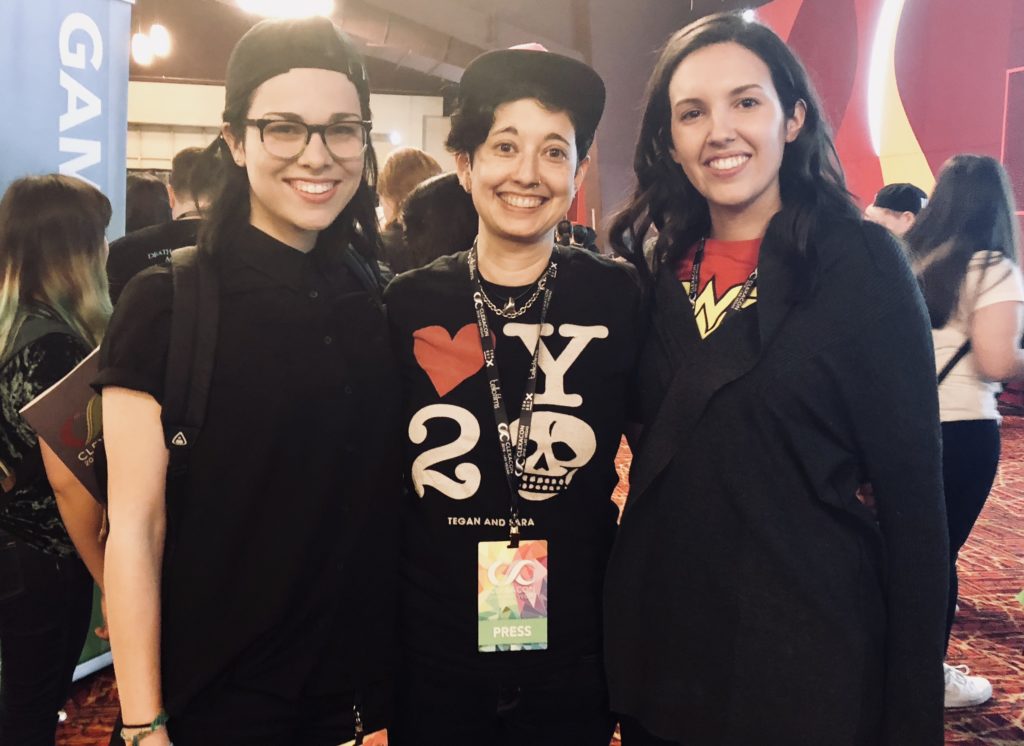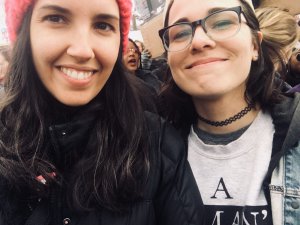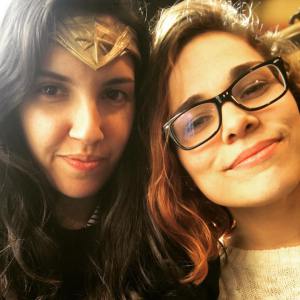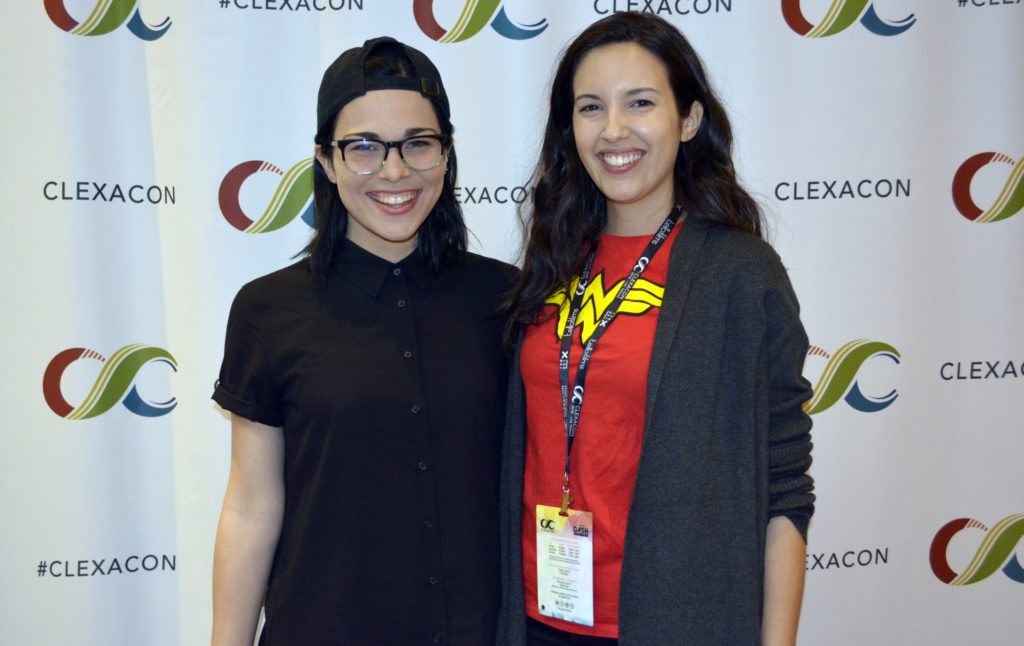The Women Behind the Harold They’re Lesbians Podcast
Erica and Nikki are the hosts and creators of the Harold They’re Lesbians Podcast. Every week they report on queer media news and have TV recaps with hilarious and insightful commentary. It is my favorite queer podcast, and I make sure to catch every episode and tweet along as I listen.
 Mika and I also had the privilege of being interviewed on the podcast, and since I knew I would be meeting Nikki and Erica in person at ClexaCon this past weekend, I returned the favor. I wanted to interview them and learn how the podcast came to be and get the behind-the-scenes story on how it’s produced.
Mika and I also had the privilege of being interviewed on the podcast, and since I knew I would be meeting Nikki and Erica in person at ClexaCon this past weekend, I returned the favor. I wanted to interview them and learn how the podcast came to be and get the behind-the-scenes story on how it’s produced.
Also, we’re excited to announce the launch of their “Let The Gays Run” merch campaign to raise funds for The Victory Institute.
The Victory Institute provides LGBTQ leaders with the training and skills necessary to run for office and win.
Buy a Shirt and Support the Victory Institute Now!
The Interview
Tracy: You two are a couple, correct?
Both: Yes.
T: When did you meet and how did you meet?
Nikki: We originally met on Tumblr.
T: You are Tumblr lesbians.
N: Yes.
Erica: The original.
N: I don’t even know how it happened. We had a lot of the same interests.
E: This was back in in 2011.
N: Tegan and Sara was the main thing. Then I saw a picture of her, and I was like, “I’m just gonna message her. Not a big deal.” We started talking and then it just happened. That was six years ago pretty much exactly. She was living in Texas about to move to Oklahoma and I was in Boston. So, it was a mistake. We started talking and I was like, “Oh, no.”
E: We didn’t start dating before we ever met. We had planned to go to ACL (Austin City Limits), which is a music festival in Austin, Texas, and we planned to meet up there. And then we did, and…stuff happened.
N: It took off. We started dating, and it was long distance for like three years.
T: Oh, wow.
N: Really tough. One summer she lived in Boston with me, but besides that we were spending all our money flying back and forth. We saw each other once every three months probably.
E: For two and a half years.
N: Dedication. Once she graduated, she moved to Boston. We’ve been living together since…
E: The end of 2014.
T: Did you come into the relationship established that you were both TV people?
Both: Yes.
E: At least fandom people. Nikki way more than me in terms of TV. But I literally created a Tumblr because I was stalking Tegan and Sara.
N: My whole childhood was TV. Obsession from the start. And I went to school for film because of it. I went to Emerson in Boston, and I studied media studies with a focus in television studies. I went for production, and then I was like, “I can not do film production.” I was on student sets and was like, “Never mind!” I just want to talk about it all the time. So, yeah, I was always really into TV.
E: I don’t know if it takes a certain kind of personality to be in a fandom, to obsess over things. It’s just the way we are and the way you are and everyone here [at ClexaCon] is. I think I’ve always been that way, and then Nikki basically was like “I watch this show, watch all of this show.” And I was like “Okay, I’ll do whatever you say because I like you.” So I just watched a ton of television. We watched Gilmore Girls, and all of One Tree Hill and stuff like that. And then when queer story lines started really taking off, we naturally gravitated towards that.
N: Also, watching TV used to be a way we connected long distance. We would both watch at the same time and be on the phone.
E: “One, two, three hit play. Oh, wait pause, I have to go to the bathroom, pause pause pause.”
N: It’s always been a part of our relationship. Fandom definitely and then it grew from there.

T: How did the podcast come to be? What is the evolution of that?
E: It’s funny because it’s so simple. For a long time we wanted to do something in the fandom world we’re living in.
N: I used to write fanfiction. I did Cophine.
E: Nikki wrote a pretty good Cophine, did a little bit of Swanqueen.
N: Oh, Swanqueen. Not good. Mistakes were made, it’s okay.
E: We co-authored a tiny Swanqueen for a very short period of time. And then, maybe two years ago, we tossed around the idea of creating a website.
N: We really wanted to start something like LezWatchTV before we knew. We were like, “Let’s do this, let’s start a list!” And we made 10 people and were like, “No, no, no, this is so much work.”
E: We did not have the skills or the resources.
N: When we did find your website we were like, “Oh, my god this is exactly what we wanted,” and we didn’t have to do the work — huzzah!
E: I was literally at work listening to a podcast and thought, “We should do a podcast.” These are things we talk naturally about all the time. Let’s put a phone in front of us and record it. We have access to a phone; we have access to a computer, and we have things to say. What else do you need to make a podcast?
N: She has always been someone who really wants to contribute and put herself out there. I’m very introverted so I was like, “No, I don’t want myself out there at all.” She always wants something new to do so she’s always pushing to be doing something. Every week she would come home and say, “I want to do a podcast.” And I was like, “No. Period. I’m not doing it.” Probably after the fourth time, I thought I was being slick, I was like, “Okay, we’ll record one,” thinking she’ll see how bad it is. Then she won’t want to do it, and I’ll win. So we recorded the first episode, and it was fun. It feels so good to talk about it; it’s therapeutic. The added layer of talking to other people — it’s like being at a convention every week. A group of people that care enough to talk about these issues.
T: You gave in and did it, and it backfired.
E: It’s funny you tell it that way. I remember her being really supportive the whole time.
N: I was trying to trick you.
E: Then we just sat down and did it. I think the first thing we ever talked about in our practice run was Orphan Black. In terms of, how we decided to format our show, that took a bit to formulate. It took a couple of trial runs.
N: It just so happened that summer season had really great shows for us to cover. Orphan Black was in the last season; Wynonna Earp was in the second; and then The Bold Type was our other. I felt like it was a natural group of shows to be talking about on a podcast because it was bringing a lot of perspectives. We don’t want to be covering only a certain —
E: Like cis, white characters.
N: That is something we think about a lot.
 T: I’m familiar with the Harold They’re Lesbians Meme. How did you choose that name for the podcast?
T: I’m familiar with the Harold They’re Lesbians Meme. How did you choose that name for the podcast?
E: I was a creative writing major. Obviously not that creative because I stole the title from an already existing meme. We played around with a couple of ones. Trash Queens, Fan Trash, then I was just like, “What about Harold They’re Lesbians?” To me it’s this funny meme that’s basically “these people are obviously queer and when people don’t realize that it’s ridiculous.” That’s part of the queer experience anyway; it’s really frustrating to be gay sometimes. Our show is an attempt to basically be “here are the queer shows you should be watching, look how queer they are and it’s great.”
N: I liked it from the start.
E: And it was something people already identified with.
T: Production-wise do you think about this all week? How much of your life does this take up?
E: It takes up a lot.
N: Throughout the week we have a document we use to pull stuff together. But then obviously every week we have to be watching these shows.
E: That’s the most difficult part.
N: Especially with Lost Girl. We were a little ambitious covering all the seasons before ClexaCon.
T: I dunno, I’m pretty proud of you for doing it.
E: I definitely feel accomplished, and it definitely feels worth it for the Lost Girl panel. When we’re not in season with shows there’s stuff we have to fill. Like now we’re only doing Black Lightning. Supergirl is on hiatus. We have to figure out other things that we’re going to watch.
N: Also the editing. Because I have the film background, I do the editing. During the week, we record at night, and then at 6am the next morning, that’s when we put it out. We have to watch a show, record and edit all in one night. That’s a huge thing for me, because we want to put out a quality product, but we only have so much time. We wish we had more time to dedicate to this.
E: What we put out is as much as we can do. It is 100% amateur.
N: But it’s part of the show.
E: We like that it’s hokey, and sometimes the sound is off. Whatever, we like that about it.
N: We want it to feel like a conversation.
 T: What has audience response been like for the show?
T: What has audience response been like for the show?
E: Positive, all positive. Every week it grows a little bit more than the last episode.
N: We’re averaging 500 listens per episode.
E: It’s way more than we ever thought we would have. When you put something out, you expect to get some sort of response, but maybe that didn’t fully register because we got a response and we’re like, “Why are people listening to this? Why has this garnered some type of following?” Even here people will come up to us and say, “We love your show,” and it feels like the weirdest thing that’s ever happened. To get this positive feedback is really validating.
N: Building a community.
E: It feels like we’re a part of something.
N: It’s like making new friends. We have all these friends now that we know on Twitter who talk to us every week.
E: About other things, too. Not just about our show. We started this podcast because we wanted friends.
N: Queer friends who watch TV.
T: On the show sometimes your discussions get a little heated. Off the show are they more heated?
N: Probably.
Both: [Laughs]
N: I can feel when we’re bickering, and I’m like, “They don’t want to hear this.”
E: I can feel when Nikki feels that we are bickering, and I can tell she’s like, “We need to stop fighting.” Then we’re like, “Pause.”
N: Sometimes we do pause when it goes one for too long, and I’m like, “You need to stop.”
E: We have so many different opinions on who we ship and who we like the most, which I think is fun, and it’s always been that way.
N: You should have heard us during Lost Girl. We were on opposite sides of the couch yelling about Docubbus and Valkubus. By the time we get to the show we’ve discussed it. Although honestly, I don’t know how much we prep for those conversations because we want it to be natural. Sometimes we will start a conversation–
E: And we’re like, “Save it for the podcast! Save it for the podcast!”
N: I like having the real arguments on there because that’s how fandom is. People argue about that stuff, and it’s all about being able to respectfully disagree.
 T: What is a show each one of you loves and the other one hates?
T: What is a show each one of you loves and the other one hates?
N: Lost Girl.
Both: [Laughs]
E: Listen, I take back every bad thing I’ve said about Lost Girl after the panel. Grey’s Anatomy, I love Grey’s Anatomy, and Nikki hates the show.
N: Hate’s strong. I don’t like the show generally.
E: You don’t know anything; your taste in TV is terrible.
N: I need you to accept it’s a literal soap opera.
E: What’s wrong with that?
N: There’s nothing wrong with a soap opera, I just feel you don’t recognize that it is one.
E: You don’t know quality television.
T: What do you see for the future of the podcast? If you had your wish list dream of where the podcast could go, where would you want it to go?
N: I would like to keep growing and using it for good. The Maggie stuff with Supergirl, that really was a big turning point for us. Recognizing that we do have the platform to provide healing. Not everyone has someone in their life that they can talk to.
E: And we hear that a lot. People tell us, “I have no queer friends, and this is what I tune in to.”
N: And this stuff is, obviously, so important to us. Representation on TV — people may not recognize the importance, but we know the importance of it. How something like the Sanvers break up can devastate a really big group of people. It’s therapeutic for us to be able to talk about it, and people are listening and using it to heal too.
E: I would like to reach more people, but it’s more important for us that, for the people we are reaching we’re giving them quality content. We want to have as many people listening to us as possible, but it’s way more important that whoever is listening to us…what we are putting out is relevant and helpful and healing.
N: More interviews. I have a dream of doing more interviews with creators. We have a segment idea, we would like to do a creator spotlight where we talk about a person who created something throughout history. Queer people behind the scenes.
E: As people we’ve grown since the podcast started in terms of putting ourselves out there and doing something that is a little bit uncomfortable, especially for Nikki over here who is sensitive and scared of things. As the podcast develops, we do too. And the only way for the podcast to develop further than what it is now is if we develop personally. Some of that is stepping outside our comfort zones which we’ve already experienced with this [ClexaCon].
N: And being here is inspiring me more about the queer creator. It’s just so rare. I would like to highlight that more, because we get queer story lines because there are queer writers in the room. That is something we would like to cover more.
Catch the Harold They’re Lesbians Podcast every Thursday. And if you like, listen to the LezWatchTV interview, below.

Loved this interview! HTL told me about this site, I’m so glad they did 🙂
Awesome! We hope you’re enjoying the site 🙂